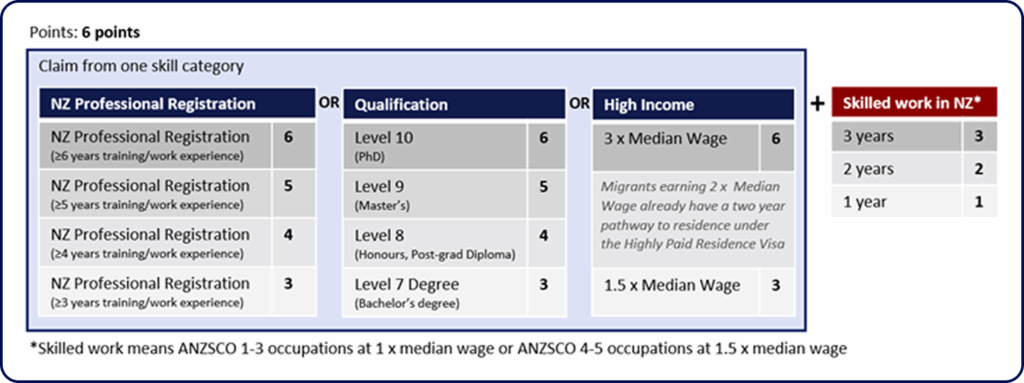At Immigration Chambers, we understand the aspirations of international students who dream of turning their academic journey in New Zealand into a lifelong opportunity. The pathway from a NZ Student Visa to permanent residence (PR) in New Zealand is structured, achievable, and rewarding for those who plan strategically. Below, we provide a comprehensive guide that outlines every step, requirement, and strategic tip to help you secure your New Zealand PR after study.
Note: In New Zealand, a person must first qualify for a Resident Visa before becoming eligible for a Permanent Resident Visa. To apply for a Permanent Resident Visa New Zealand, the individual must hold a Resident Visa for at least two years and meet the minimum time spent in New Zealand requirement. Both visas grant the holder the right to live in New Zealand indefinitely. The key difference is that the Resident Visa includes travel conditions, whereas the Permanent Resident Visa does not. We will discuss further in a separate article.
Complete Your Qualification from a Recognised New Zealand Institution
The first and most essential step towards New Zealand Skill-based Resident Visa is completing a recognised qualification from an approved New Zealand education provider.
Eligible qualifications include:
- Bachelor’s Degree (Level 7)
- Graduate Diploma (Level 7)
- Postgraduate Diploma (Level 8)
- Master’s Degree (Level 9)
- Doctoral Degree (Level 10)
Completing your study ensures you’re eligible to apply for a Post-Study Work Visa, the most critical transitional phase toward residency.
Transitioning from NZ Student Visa to Post-Study Work Visa (PSWV)
After completing your studies, if you are eligible, you can apply for a Post-Study Work Visa (Open) to remain in New Zealand legally and gain local work experience.
Key Features:
- Validity: 1 to 3 years depending on qualification level.
- Work Flexibility: Allows full-time employment in any field.
- Application Window: Must be applied for within 3 months of your New Zealand student visa expiring.
You are not required to have a job offer at the time of applying for a Post-Study Work Visa, making it a powerful step for newly graduated students.
Basic Requirement for all Skill-based Resident Visa
- Have a job offer from a NZ Accredited Employer (Yes! You read it right. No Skill-based Resident Visa without at least a job offer from a NZ Accredited Employer), and
- Meeting all other requirements, depending on which type of NZ Skill-based Resident Visa that you are applying for.
Tip: Begin job hunting before your study ends. Use New Zealand job portals like Seek, TradeMe Jobs, and official company websites.
Apply Under the Skilled Migrant Category (SMC)
The Skilled Migrant Category Resident Visa is the primary route for international graduates to gain residency. Skilled Migrant Category Resident Visa uses point systems (6 points). There is a more straightforward resident visa called the “Straight-to-Residence Visa,” but it is not available to everyone. It is linked to the Green List roles, meaning only those working in an occupation listed on the Green List and meeting the specific requirements for those roles are eligible.
Eligibility Checklist for Skill-based Resident Visa :
- Age under 55 years
- Good health and character
- English language proficiency
- Recognised NZ qualification / NZQA-approved Qualification
- A job offer from NZ Accredited employer or/and Skilled NZ work experience
Understanding the New Zealand Residency Points System
New Zealand Immigration evaluates Skilled Migrant Category Resident Visa applicants using a points-based system. Here’s a breakdown:

Since we discuss studying as a pathway to NZ Resident Visa, you can focus on the table which states “Qualification”. It shows how many points you will get after you complete the Qualification.
For example: For those who completed Level 9 (Master Degree), they will obtain 5 points – meaning just 1 last point to go. How to obtain the one last point? As shown in the graph, the remaining points can be obtained through “Skilled Work Experience in NZ”. We will discuss in the next article on how to Immigration New Zealand defines “Skilled Work Experience”.
Submitting EOI (Expression of Interest)
You will need to be eligible to claim 6 points at the time of submitting EOI. Based on the information you input when lodging an EOI, you will either get an Invitation to Apply (ITA), or it will let you know if you are not meeting the requirement and therefore, can’t apply for a Skilled Migrant Category Resident Visa until you become eligible. It costs $0 to apply for an Expression of Interest (It’s free, but it’s important to be very sure that you are eligible for it).
Include Family Members in Your Application
You can include the following dependents in your Skilled Migrant Category application:
- Spouse/partner
- Dependent children
(under 25 years)(Aged 24 or younger)
They must also meet health, character, and English language requirements.
Alternate Residence Pathways
While the Skilled Migrant Category is the most general route for students, you may also qualify through:
1. Partner of a New Zealander Resident Visa
For those in a genuine and stable relationship with a New Zealand citizen or permanent resident.
2. Entrepreneur and Investor Visas
For graduates with significant capital or an intention to start or buy a business in New Zealand.
Benefits of Obtaining Residency in New Zealand
- Live and work in NZ indefinitely
- Access to publicly funded healthcare and education
- Freedom to enter and leave New Zealand
- Pathway to New Zealand Permanent Residency and to New Zealand citizenship
- Eligibility for family sponsorship
- Enjoy social security benefits
Important Tips for Resident Visa Success
- Always keep your visa status valid – overstaying can jeopardize future applications
- Always be truthful in every visa application to Immigration New Zealand. We often find that some individuals withhold important information, such as previous visa declines. Immigration New Zealand has access to various sources and may receive information from third parties, including other immigration authorities. If discrepancies are discovered later, this can lead to a character issue being noted on the person’s immigration record—or even result in the cancellation of their visa.
- Maintain clean character and health records
- Keep copies of all documents, job contracts, and performance reviews
- Regularly monitor Immigration New Zealand updates, as policies may evolve
Final Thoughts
Achieving NZ Residency in New Zealand after studying requires thoughtful planning, consistent performance, and timely action. By leveraging post-study work opportunities, gaining relevant experience, and strategically aligning with Immigration New Zealand’s expectations, you can turn your study journey into a permanent home.
At Immigration Chambers, we are committed to helping you every step of the way, from transitioning NZ Student Visa to full PR success. If you’re ready to take the next step toward securing your future in New Zealand, book a consultation with our expert Immigration Lawyer Auckland today.
FAQs
1.How does gaining a New Zealand qualification give me a head start in qualifying for a New Zealand Resident Visa?
To qualify for any of New Zealand skill-based Resident Visa, you generally need a job offer from an NZ Accredited Employer and to meet all other requirements based on the type of Skill-based Resident Visa that you are applying for. The challenge is that employers may not recognize your overseas qualifications/work experiences or may hesitate to sponsor a work visa due to added time and cost on the employer’s side. Most employers will prioritize to hire those who have a valid work rights in New Zealand such as NZ Citizen, NZ Resident Visa holder, NZ Post-study Work Visa holder, etc.
Earning a New Zealand qualification helps by making you eligible for a Post-Study Work Visa, securing first few points after completing the qualification and give you a way to obtain the final points needed for residency. In addition to that, in general, a student visa holder will usually have a part-time work rights – meaning that you have gained NZ work experience even before you graduate.
2. Do I need to study for a role that is in Green List roles?
No, you don’t. You can definitely try to balance out your choice of study with its future prospect in relation to migration. However, we always suggest that you study a qualification which aligns with your career aspirations. If a person has a job offer in a Green List role and meets all other requirements, they can apply for a “Straight-to-Residence Visa” without needing to earn the 6 points required under the “Skilled Migrant Category Resident Visa”.
However, if your role is not listed on the Green List, you still have a pathway to a New Zealand Resident Visa through the “Skilled Migrant Category Resident Visa,” which requires 6 points. While working in a Green List role offers a more straightforward pathway, even if your role is not on the list, you still have a viable route to residency after completing your study.
3. Can I include my spouse and children in my PR application?
Yes, you can include your partner and dependent children (aged 24 or under) in your Skilled Migrant Category Resident Visa application. They must meet character, health, and (in some cases) English language requirements.

